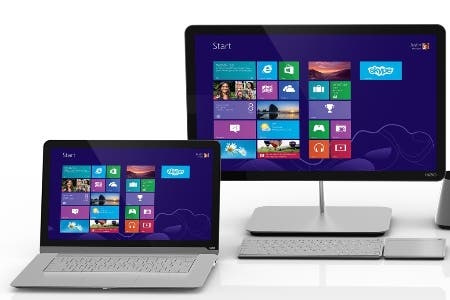Was Gabe Newell right to declare Windows 8 a catastrophe?
Developers dissect Microsoft's attempt at making the PC a closed system.
Windows 8 has not had a smooth launch. Microsoft's fledgling operating system was still in beta when Valve boss Gabe Newell branded it a “catastrophe for everyone in the PC space”. His comments were quickly echoed by World of Warcraft developer Blizzard, while Minecraft creator Notch denounced the OS as being “very, very bad for indie developers”.
One of the biggest concerns surrounding Windows 8 is its move towards a closed gaming marketplace. Users are now encouraged to buy apps through the Windows Store, an emulation of the iOS App Store model that allows Microsoft to regulate game releases and take a cut of the profit.
"They've got Apple envy, big style,” co-founder of developer Introversion Software Chris Delay told Eurogamer. “In the past they were the successful ones, but then they sat down and watched while Apple took over. It's left Microsoft looking old and behind the times. They look at Apple and the iOS Store and see the royalties they're taking on this closed platform.”
A storefront owned and regulated by Microsoft is something that worries Miles Jacobson, boss of Football Manager developer Sports Interactive.
"I actually think Gabe might have seen the internal email that I sent here on Windows 8." It was "difficult" to be a seasoned PC developer in a world where Microsoft was no longer welcoming, he added. "Personally I don't think they still want that market to exist,” Jacobson said.
"I actually think Gabe might have seen the internal email that I sent here on Windows 8."
Miles Jacobson, Sports Interactive boss
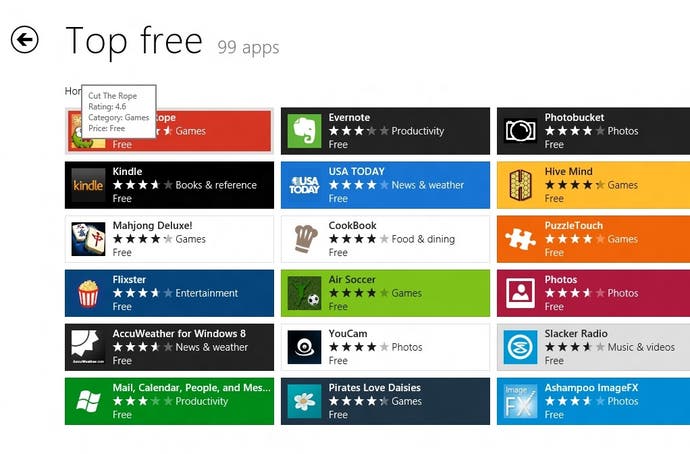
Windows 8 marks a significant step down the road to a closed environment. The new Windows Store is built into the operating system's Metro-style desktop. It's the only way to download apps on Windows RT devices, which exclusively run games bought from the Windows Store. The old Windows 7-style Desktop mode is still available on all Windows 8 versions, although on RT can only be used for Microsoft's own Internet Explorer and Office applications.
"I think it's very confusing for the market to have two different options in one,” Jacobson explained. It took him four Twitter messages to explain the differences in Windows 8 versions to his followers. Sports Interactive had to post a similar statement on its forum, but ended up locking the thread because "it's not [their] job to explain Microsoft's systems to people".
Jacobson worries this is a dangerous sign for the future. "If [Microsoft] were to remove Desktop mode from the operating system, we'd be turning around and telling people if you upgrade you won't be able to play Football Manager any more. I would like to think, probably naively and arrogantly, that might stop some people from upgrading if it was to be the case.”
There are ways to still have a Football Manager 13 link on the Windows Store that takes users to buy it at another retailer, Jacobson added, but the solution is not ideal.
“It looks more and more like a foot-in-the-door technique,” Alen Ladavac, chief technology officer at Serious Sam developer Croteam, recently wrote in an impassioned attack on Windows 8 via the Steam forum. “A large number of developers have expressed their concern with [the] possibility that, probably in Windows 9 or something like that, the ability to get even desktop apps in any other way than through Windows Store may very well be removed. When that happens it will be too late.”
"Microsoft is definitely headed that way. Thinking ahead to Windows 9 or 10 you can see them asking you to have the Windows 9 Ultimate Edition to let you install non-Windows Store software.”
Miles Jacobson, Sports Interactive boss
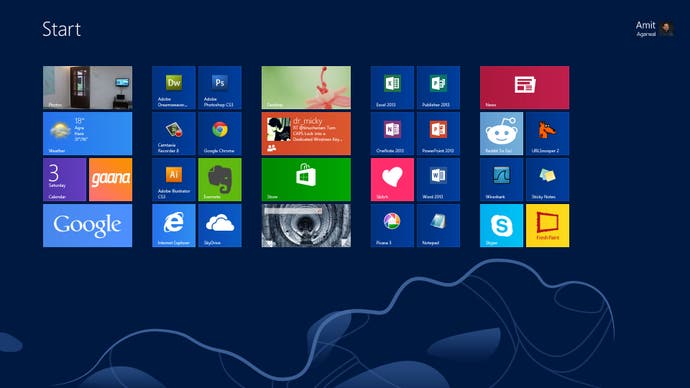
It's easy to see why Gabe Newell is worried. The Windows Store poses a threat to Steam, and Microsoft's perceived trajectory even more so. It's no coincidence that, just days before Newell's outburst, Valve announced Steam support for Linux.
“Gabe Newell did not overreact. The new tiled UI is a means for Microsoft to lock Windows apps into a walled garden, much like the one on iOS,” Ladavac wrote, arguing that the current Windows Store architecture creates a two tier system: apps not bought through the Windows Store are displayed with a static icon. Those that are get a live tile which can display information on friends currently playing, numbers of people online or messages about DLC sales.
“If it was just about 'being downloaded from Windows store', it would not be a problem. It would be nice to have a common hub to download things from. But to get an app onto that store, it has to be certified by Microsoft. So far, we know that they've banned mature games, like Skyrim, Call of Duty, and Serious Sam [a policy that is being revoked]. They have forbidden modding. They could very well forbid Open Source if they want.”
But it's not all doom and gloom. Far from Notch's claim that the operating system would be terrible for all indie developers, an early crowd of adopters has been welcomed onto the store with open arms.
“From the perspective of us having no money… we looked at Android and iOS and we would have been lost amongst 500,000 other apps,” Aj Grand-Scrutton, CEO of indie outfit Dlala Studios said. (“I say CEO,” he adds sheepishly, “I just want to make myself sound fancy even though I work in my Mum's garage”).
Dlala's first Windows 8 game is Janksy, a physics-based sci-fi puzzler. It cost the team £70 for a year's store fee (compared to £100 for an Apple developer licence) and they can update their game as much as they like for free.
“With Windows 8 we launched and there was something like 500 games on the store - that's nothing. The real deal sealer was when I spoke to the guys from Microsoft and they're lovely to work with.”
"From the perspective of us having no money... we looked at Android and iOS and we would have been lost amongst 500,000 other apps."
Aj Grand-Scrutton, Dlala Studios CEO
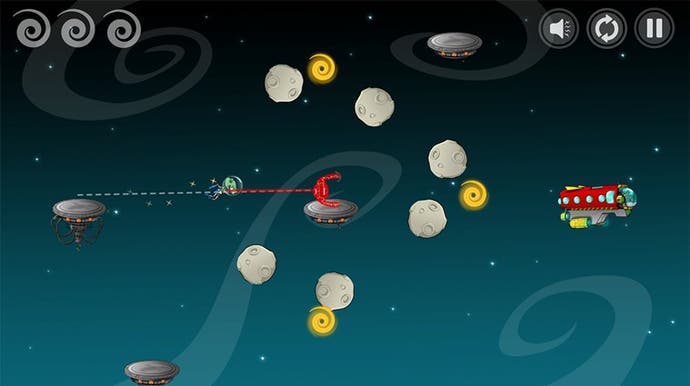
It's a change of tune from earlier days at least. Delay recalls launching a version of Darwinia for Windows Vista. “Even then it was a real pain to jump through Microsoft's hoops. We had to include an Xbox control mode in case anyone plugged in a controller and redo graphics to make it work properly on bigger screens. We went through all the certification and it ended up selling about ten copies.
“Then we did Darwinia for Xbox 360 and it had all of that turned up to eleven. They're a company that will write you thousands of pages worth of requirements. You don't want all that getting in the way.”
Grand-Scrutton can only report good things. “We read the article on Eurogamer about Gabe saying Windows 8 was going to be awful and thought Microsoft were all going to be arseholes. But we got to know them and we got support from them and they're fantastic. We've had almost 24-hour technical support when we needed it.
“I don't know where the market is going,” he continued. “There are negatives to having a closed market but having that means there is a level of quality control throughout the whole process. They are fully in control of every game going through their double testing procedure and certification process so you don't get a load of crap.
“I can see the other side as well and [Newell] is going to have a different take with Steam. We're just going to have to see how things develop. But with us as an indie, we founded ourselves 10 weeks ago and we've got a game published on Windows 8 now. I would recommend it to any other developer.”
“I'd be interested to hear what [Newell] thinks of iOS,” said Rajat Gupta, boss of start-up PC streaming service Agawi, which has just released a version supporting Windows 8 devices. “Many developers and consumers don't care it's a closed system. All consumers want is an easy way to access applications on a platform they can love.”
While far from perfect there are, of course, many advantages to a closed games marketplace. It's hard to find a more prevalent example than iOS.
"One could argue that iOS is the tidiest managed eco-system and look how developers have been drawn to it."
Rajat Gupta, CEO of Agawi
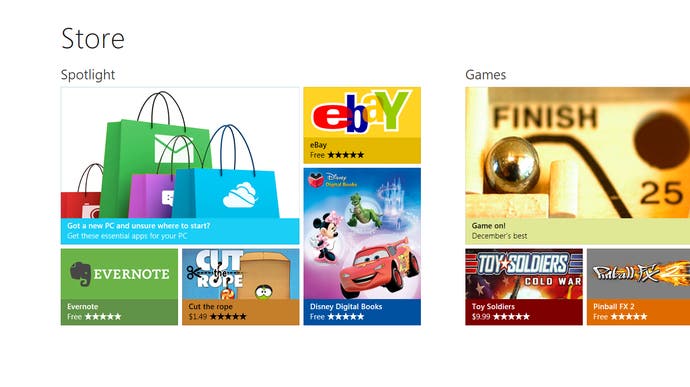
“One could argue that iOS is the tidiest managed eco-system and look how developers have been drawn to it,” Gupta reasoned. “Look at Android - it's very open and the eco-system is in complete turmoil. I hear what Gabe's saying but he's looking at it from a different perspective, and that may be unique to the company that owns Steam.”
“iOS has a lot of great content,” Grand-Scrutton added. “Android is a bit sluggish - the certification process you go through isn't quite as strict so they don't have the same quality level.”
Even Delay can't argue with that fact. "It creates a much higher standard of product,” he agreed. “When you start an iOS application, if it's not launched within 15 seconds the OS kills it. And because Apple had that rule from the very beginning you never see apps that take ages to load. Similarly, [Microsoft] can control the quality, get a cut of the price and solve a lot of the security issues.”
So why all the fuss about Windows 8 if a closed marketplace works so well on Apple products? Delay's dislike of such a system is essentially down to two reasons - a continued lack of trust in Microsoft, and the fact that such a system is better left to consoles and not the core PC audience.
"I really don't want to see the PC becoming a closed platform. Microsoft is not a company that's able to benignly oversee that process. They will f*** it up. We'll all be doing Kinect support and 16 language versions, we'll all be supporting a Microsoft Office plug-in. It's my own worst nightmare.
“Sure it means your software is a bit more buggy, a little more crappy and crashes more often. But the flipside of that is you get DayZ. It's full of bugs, it's hard to connect to anything, but it's one of the best gaming experiences I've ever had. It would never have come out on Xbox Live because it wouldn't have passed certification in that state.
“The PC continues to be as relevant as it was ten years ago, despite consoles coming and going, because it is an open platform. If that changed it would be terrible.”
Where the future of the PC lies - Microsoft's vision of the PC at least - will surely be decided by developer and consumer response. However, was Gabe Newell right to declare Windows 8 a catastrophe? It is far too early to draw any firm conclusions, but the consensus suggests that Microsoft is testing the water with Windows 8.
